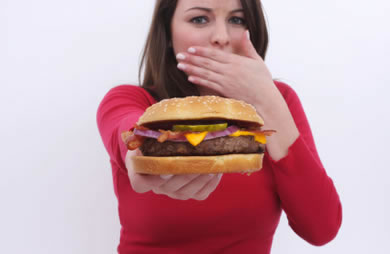Tuesday, June 5, 2012
You may be very open minded, and consider yourself to be quite flexible, but still, deep down, you may not be completely comfortable with the idea of changing your diet, which is normal. Change comes hard to most people because it usually means giving up something. In this case, you’re giving up precious calories. Some change is necessary and inevitable, though, if you’re going to break free once and for all from unhealthy behavior patterns like overeating, underexercising, and thinking self-defeating thoughts.
In the following sections, I show you how to recognize your unhealthy behaviors and typical dieting styles.
Recognizing problem behaviors
Sometimes you may do something for no reason other than you’ve been doing it that way for so long. You form habits — good and bad — by repetition. You may have acquired your earliest habits first from family members and later from friends, but they became embedded in your lifestyle by years of repetition.
The types of food you eat, your eating patterns, your exercise routine, the way you think about yourself, and the way you view the world around you, are all habits you’ve developed by eating the same foods, making the same choices, coming up with the same motivations and the same excuses, and thinking the same thoughts, over and over again, throughout your life. These behaviors shape who you are. They also help determine your shape!
Know thyself
Your first step toward developing healthier habits is to look inward and think hard about changing your ways. Thinking about change is an important part of the process of enacting real change, so if all you can do right now is think about it, you’re still on the right track. For more about making healthy changes, see “Giving Yourself a Lifestyle Makeover,” later in this chapter.
Remember
You’re probably wondering why you need to do all this soul searching. Why not just skip straight to Chapter 6 and go on a low-calorie diet? You need to search inside because a successful weight-loss plan is about making lifestyle changes, and you can’t change what you don’t know or understand. The better you know yourself, the better your chances of getting to the root of your weight problem to conquer it once and for all.
Breaking your bad habits
It wasn’t a banana that made you overweight. It wasn’t your grandmother’s lasagna, the slice of chocolate cake at a birthday party, or that double cheeseburger you devoured on your way home from work. No individual food is possibly responsible for your weight gain, but your habit of overeating some of these foods probably did you in.
Which of these behaviors contribute to your bad eating habits? Check the ones that apply to you.
| I eat randomly. | |
| I eat too much food at once. | |
| I eat when I’m sad. | |
| I eat out often. | |
| I routinely skip meals. | |
| I eat on the run. | |
| I eat at fast-food restaurants. | |
| I eat when I’m lonely. | |
| I eat too quickly. | |
| I eat when I’m not hungry. | |
| I eat when I’m bored. | |
| I eat late at night or just before I go to bed. | |
| I eat snacks all the time. | |
| I wait more than four or five hours before eating. | |
| I eat a lot of high-fat foods. | |
| I eat a lot of high-calorie foods. | |
| I eat when I’m angry. |
The habits you checked are the eating habits you need to focus on when you’re thinking about the lifestyle changes you have to make to accommodate your low-calorie lifestyle.
Eating, exercise, and other lifestyle habits don’t change overnight. You can’t just suddenly cut your calorie intake in half without some mental preparation. You can’t just get up one morning and run a marathon if you haven’t been training. Changing the thinking patterns that dictate your behavior takes time, patience, and a fair amount of retraining.
Examining Your Current Diet Habits
2012-06-05T00:04:00+02:00
Andrea
Chapter 4|
Subscribe to:
Post Comments (Atom)
Subscribe via email
Labels
- Calorie (1)
- Chapter 1 (5)
- Chapter 2 (14)
- Chapter 3 (18)
- Chapter 4 (10)
- Eating (1)
- Food (1)
- Health (1)
- Mental Health (1)
- Mindful Living (1)
- Support Groups (1)
- Tools (1)
- Weighing scale (1)
- Weight (1)
- Weight gain (1)
- Weight loss (1)

